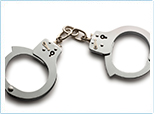We know scammers are out there, impersonating the authorities and conjuring up different schemes to fool people into giving them money. They might say they’re calling from the IRS because you owe taxes. Or claim they’re from the FTC, calling to help you recover money lost to a scammer. But now we’re hearing about a new ploy: scammers are impersonating the police! That takes some chutzpah, huh? Here’s how it works.
You get a phone call. Someone you care about is in jail and, they say, you need to pay up to bail him out. The scam-detecting radar in your head immediately goes off. You’re skeptical – but the caller ID says the call is from the police department. And, let’s be honest, your nephew is a knucklehead and you can totally imagine him being arrested. So, you keep listening.
The caller tells you to put money on a prepaid card and give him the card number. Now your scam-detecting radar is going off the charts. You know that police departments — and the federal government, for that matter — don’t tell people to pay with prepaid cards. You also know using a prepaid card is like paying cash — once the money is gone, you can’t get it back.
“But what about the caller ID?” you wonder. In fact, what seems like reliable information about the source of a call isn’t so reliable anymore. Scammers can rig caller ID to look like they’re calling from the police department. Or, really, anywhere — even your own number. Don’t rely on caller ID. It’s not foolproof. Scammers can easily spoof it to try to gain your trust. If it looks like the police are calling, look up the non-emergency phone number (hint: it’s not 9-1-1) and call to find out if the story is legit. You’ll soon learn it’s a scam.
Report the imposter to the FTC at ReportFraud.ftc.gov.
To learn more, read How To Avoid a Government Impersonator Scam.

In reply to I got a call from 281-205 by Vatsan
Never give out or confirm financial or other sensitive information, including your bank account, credit card, or Social Security number, unless you know who you're dealing with. Scam artists can use your information to commit identity theft — charging your existing credit cards, opening new credit card, checking, or savings accounts, writing fraudulent checks, or taking out loans in your name.
In reply to I had a person say that they by Dodgeman
This sounds like a scam. You can call the Breckenridge police department to report it. You also can report the imposter to the FTC at ftc.gov/complaint. Select the category “Scams and Rip-offs” then “Impostor Scams”.
To learn more, read Government Imposter Scams or listen to these tips.
In reply to I got a call from a guy in by Thunderstorms 1
If someone threatens you, you can contact the police.
In reply to Someone called me about a 3 by Teet31
That sounds like a scam. If they send you a bad check, and you send them $497 before your bank finds out it is a bad check, you will lose $497. If you send them money and the bank finds out later that the check is bad, you will have to repay the bank all the money you withdrew.
In reply to Getting calls from 515-897 by mrharv
This FTC article about blocking unwanted calls has some ideas about your options.
In reply to I got a call today (8/20/2018 by blah
In reply to I received a phone call by Greg
Pagination